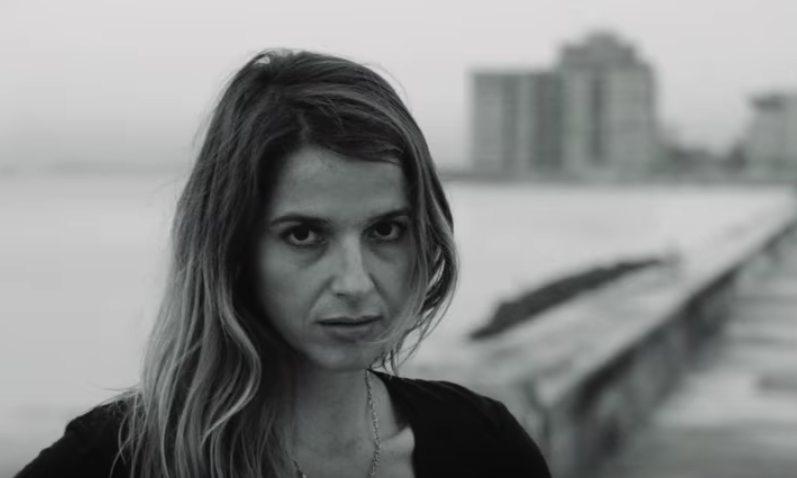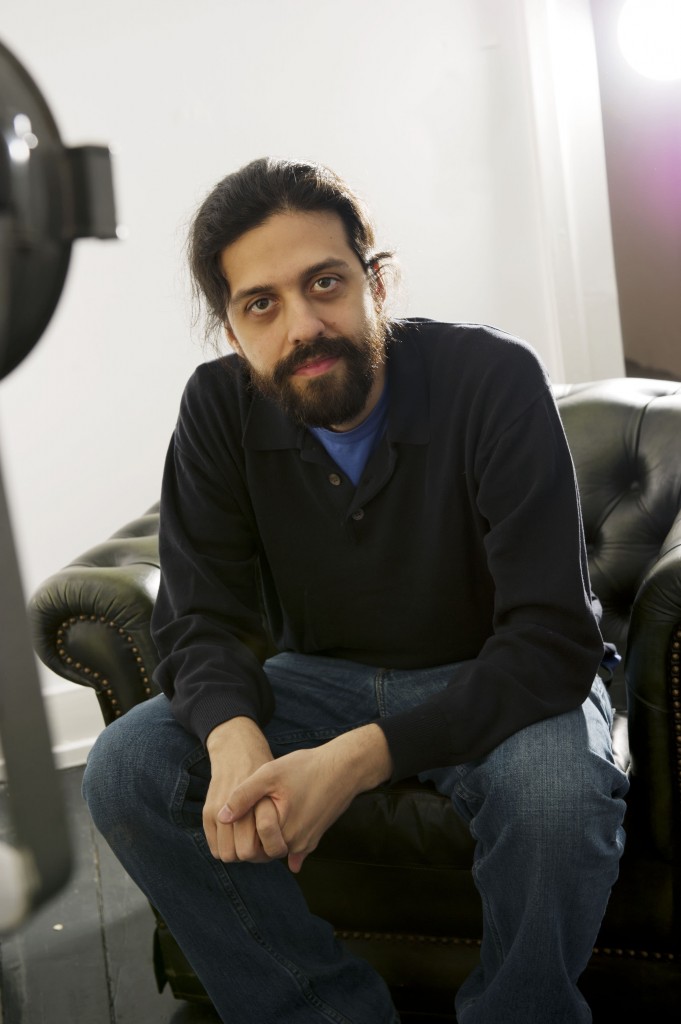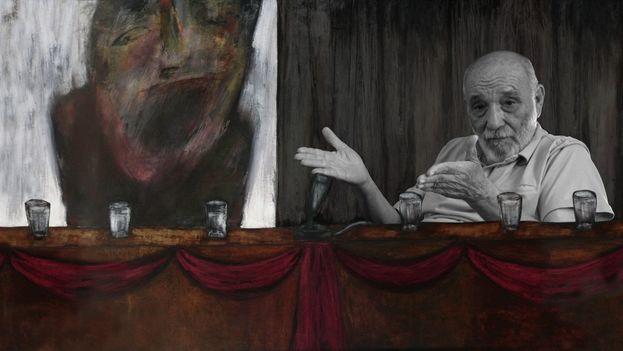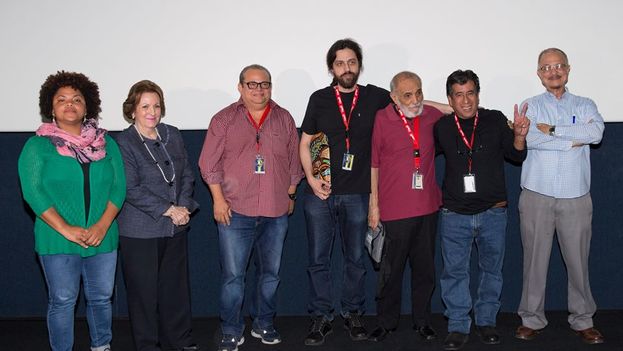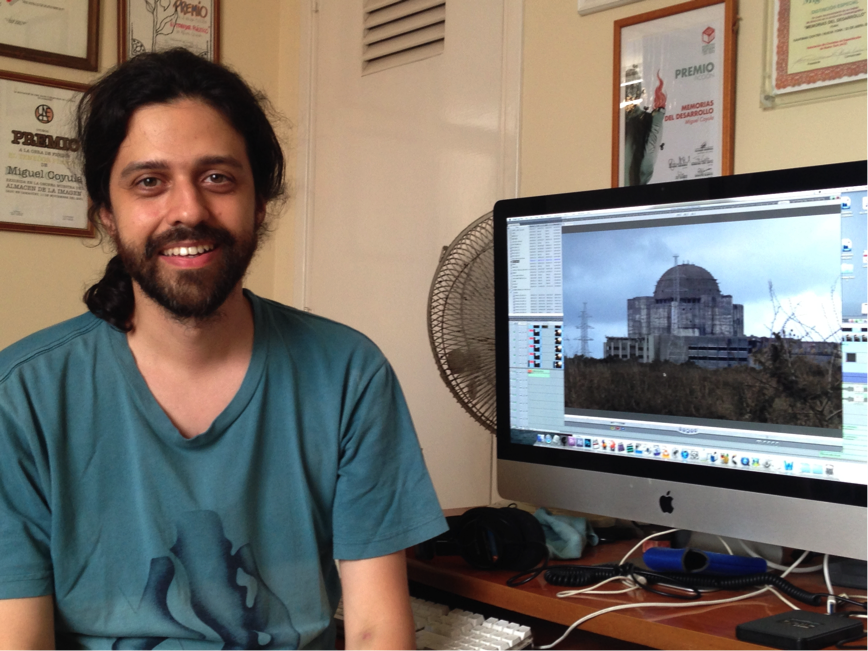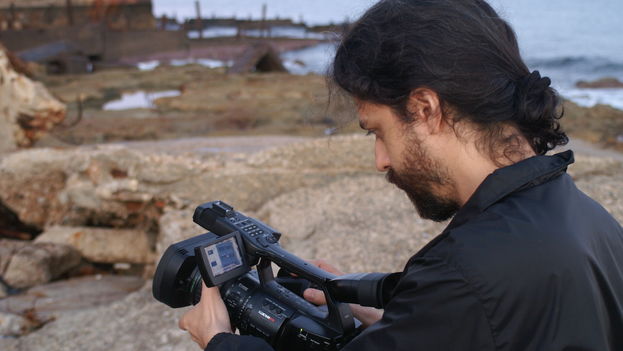14ymedio, Luz Escobar, Havana, 31 July 2015 — Shy, but with a quick wit and a direct expression, the filmmaker Miguel Coyula (b. Havana 1977) opens the door the room where he works and lets 14ymedio into this creative space in a Vedado apartment. The director of Memories of Underdevelopment is craftsman of the cinema: he films, directs, edits, does the special effects and music, all the while organizing the entire production of the film.
Over coffee, he talks about the obstacles to making films in Cuba and his new project Corazón Azul (Blue Heart), a story set in an alternative reality after an explosion in genetic engineering. In this fictional future, the Cuban government launches the literal creation of its old dream: the New Man.
This is out of necessity. It takes a long time because the structure of the production is to treat each scene as if it were a short film in itself. That is, film a scene, edit it and then start the next scene. It is the only way that has worked for me because it is very difficult to synchronize all the actors. They have to do other things to live, accept other projects, and it makes if hard for me to get them all together to film a scene.
Escobar. So it takes a long time?
“Cinema is like vomiting the subconscious in images, trying to eliminate all possible rationality.”
Coyula. It can take me a month to do two scenes. It takes longer because I do the camera work, the editing, the sound design, the special effects… since I don’t have any money, I end up putting in the time. It is the price I pay. I’m thinking something similar to what happened with “Memories of Overdevelopment,” I had 40 minutes of it done when I got a Guggenheim Fellowship and with that I was able to film the missing scenes. This knowing how to find the money is a talent some people have and others don’t. Unfortunately I don’t have it and I do what I do, which is to move forward and make the film grow bit by bit.
Escobar. Where did the idea for this film come from?
Coyula. Blue Heart, and my first feature film, Red Cockroaches, are based on a novel I wrote in 1999 called Red Sea, Blue Evil, which was published two years ago by La Pereza Ediciones in Miami. There will be a third, which is the main story of the book, but I don’t know when.
Escobar. With the kind of film that you do, how difficult it is to find budget or to get into the film festivals?
Coyula. In the European institutions, which often finance moviemaking in that area, they have created a concept they call, “cinema of the Latin American author.” These are profiles which strengthen a kind of filmmaking in which there is a specific social context, a minimalist staging without manipulating the image, the story. There is no room for science fiction in this. In addition, Blue Heart is not pure science fiction, so it doesn’t fit into the film industry models. It is a hybrid of many genres and formats.
Escobar. Auteur cinema?
Coyula. This concept is a bit absurd, like that of the Hubert Bals Foundation in the Netherlands. Seeing the projects they finance, you see that the movies begin to resemble each other. It is putting art into a profile, creating a style, something that has nothing to do with auteur cinema where supposedly one looks for the distinct.
Escobar. Why do you introduce animation into your films?
Coyula. In many of my films special effects and animation have been ways to resolve them. I also grew up watching cartoons, and I really liked the Japanese ones in which each frame of a sequence is in a different plane. Every time there is a cut, each new image is a frame that has not been used before in the scene. I use this in the way I build the visual grammar of my films to escalate the tension in a scene.
”This position of distance and of criticizing everything is very important when it comes time to create.”
I also noticed that the Japanese didn’t have a big budget to do animation at 24 frames a second like Disney, so they concentrated on the most striking visual design, because the animation was very limited and they didn’t have the money to make it very fluid. Clearly, this then became a style.
Escobar. What is your opinion about the aspirations of the G-20 Group which, within the margins of the Cuban Institute of Cinematographic Art and Industry (ICAIC), is pushing for the implementation of a Film Law for Cuba?
Coyula. I feel good about what they’re doing. Making movies consumes so much of my time that I feel going to meetings in this country is a waste of time. On the other hand, the laws scare me a little. I want more cinema and fewer laws. The fact that this comes coupled with a tax worries me, it could be very harmful to people who are making non-profit films.
They could end up imposing the same tax on a filmmaker who is making a reggaeton video clip as on another who spends years filming a movie that isn’t going to make any money, that isn’t commercial. I attended one of those meetings at the beginning but I haven’t gone back.
Escobar. You are considered an “odd duck” among Cuban filmmakers. How do you see yourself?
Coyula. I try to make films that I would go to see. I don’t see cinema as it was often seen in the ‘60s, as an instrument of transforming the thinking of a country. If it generates dialog, of course that is very good, but I, at least, can’t create with that in mind. Cinema is like vomiting the subconscious in images, trying to eliminate all possible rationality. For example, I write a scene and try not to think too much about what it means. Afterwards, when I am editing, is when I start to intellectualize. But, more than anything, I am looking for the sensuousness of the ideas that come to mind.
Escobar. Do you belong to the generation that was going to be the New Man?
Coyula. Most of us, when we were teenagers and we realized that Cuba would not be a utopia, we became critical of any political system, be it socialism or capitalism. On the other hand, for creativity I think it was good because this position of distance and of criticizing everything is very important when it comes time to create.
“The question is: it’s Fidel Castro, so what? In all societies of the world the rulers serve as an inspiration for artists.”
Escobar. What do you think about the censorship of the work The King is Dying by Juan Carlos Cremata?
Coyula. Many have criticized the interpretation of the meaning of the work by the National Council of Performing Arts, saying that Fidel Castro was the central character. It does not take a genius to see a play called The King is Dying, in today’s Cuba, refers to Fidel Castro. The question is: it’s Fidel Castro, so what? In all societies of the world the rulers serve as an inspiration for artists.
Utopia would be to achieve a society where the work is on the playbill and everyone could decide whether or not to enter the theater. Including getting up and leaving if they don’t like it and demanding their money back, as happens in other parts of the world.
Escobar. You lived for years in the United States. How is it to return to Cuba?
Coyula. I won two scholarships in the United States, but came and went constantly. The way I live and make films has been the same in any part of the world where I’ve been. For me, the camera becomes an extension of my arm and the computer the place where I do everything. I isolate myself to make my films, and this could be the same in New York as in Havana, I live for that.

